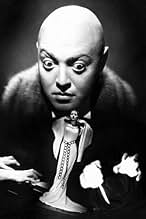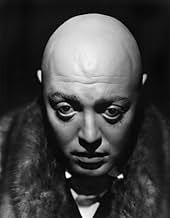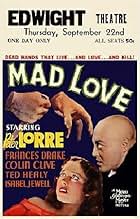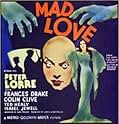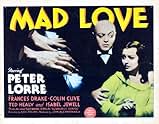VALUTAZIONE IMDb
7,2/10
6224
LA TUA VALUTAZIONE
A Parigi, l'ossessione di un chirurgo demente per un'attrice britannica lo porta a sostituire segretamente le mani maciullate del marito pianista con quelle di un assassino ghigliottinato la... Leggi tuttoA Parigi, l'ossessione di un chirurgo demente per un'attrice britannica lo porta a sostituire segretamente le mani maciullate del marito pianista con quelle di un assassino ghigliottinato lanciatore di coltelli.A Parigi, l'ossessione di un chirurgo demente per un'attrice britannica lo porta a sostituire segretamente le mani maciullate del marito pianista con quelle di un assassino ghigliottinato lanciatore di coltelli.
- Regia
- Sceneggiatura
- Star
- Premi
- 1 candidatura in totale
Sara Haden
- Marie
- (as Sarah Haden)
George Davis
- Chauffeur
- (scene tagliate)
Billy Dooley
- Undetermined Role
- (scene tagliate)
Harold Huber
- Thief
- (scene tagliate)
Isabel Jewell
- Marianne
- (scene tagliate)
Leo White
- Undetermined Role
- (scene tagliate)
Sam Ash
- Detective Arresting Stephen
- (non citato nei titoli originali)
Hooper Atchley
- Train Conductor
- (non citato nei titoli originali)
Agostino Borgato
- Stage Doorman
- (non citato nei titoli originali)
Maurice Brierre
- Taxi Driver
- (non citato nei titoli originali)
Recensioni in evidenza
German actor Peter Lorre made his American film debut in "Mad Love," which I believe was an MGM release and proved to be competition for some of the popular Universal Horror films of the time. Peter Lorre had made his epic debut with 1930's "M," in which Peter amazingly played a child-killer under director Fritz Lang. Peter is a demonic performer if their ever was one, and every memorable scene in this film has Peter's lonely mad doctor character at the helm. Peter is very much in love with a stage actress who is preparing to marry a popular pianist, and all of this gets in the way of Peter's fantasy to have the woman all for himself. A train accident occurs, which leaves the pianist with little hope, but it is Peter the doctor who goes about replacing the pianist's hands with those of a dead criminal, whom Peter himself had watched the beheading of a few days before the train accident. Things take a very silly turn, when the hands somehow take over the very personality of the pianist, and Peter's mad doctor plays the innocent with the pianist, while at the time, telling his actress girlfriend that he is simply mad and that she should stay far and away from him. I would rather not mention how the story unfolds, because that would ruin the good fun for those who have yet to watch this feature, but I must admit that the ending is very funny in a sad way, and there's so much going on with Peter's sanity throughout the film. Worth seeing for a variety of different reasons, so watch it.
The legendary Karl Freund is definitely better known for his highly innovative work as director of photography, resulting in an extensive career (spanning across 5 decades) of beautiful and pioneering cinematography. With a body of work as impressive as his (ranging from Lang's "Metropolis" to TV's classic "I Love Lucy"), it is understandable that Freund's work as a director gets so easily forgotten. The fact that he only directed 10 films in his career also plays an important factor in this, however, at least 2 of his directorial efforts easily rank among the best horror movies ever made. The first one of the two (incidentally, his first work as a director in America), 1932's "The Mummy" is really the most popular, given that it is also one of the best performances by horror icon Boris Karloff; however, it is in the second one where Freund's talents really shine, making this last movie as a director his final masterpiece.
Loosely based on Maurice Renard's novel, "Les Mains d'Orlac" (literally, "The Hands of Orlac"), "Mad Love" is the story of Dr. Gogol (Peter Lorre), a brilliant surgeon deeply in love with a beautiful theater actress named Yvonne Orlac (Frances Drake). When season ends, Yvonne announces her retirement, and this prompts Gogol to finally meeting her. Unfortunately for Gogol, Yvonne tells him that she is actually married to concert pianist Stephen Orlac (Colin Clive). Saddened, Gogol leaves, but a bizarre turn of events will make him meet Yvonne one more time: Stephen has lost his hands in a terrible train accident and only Gogol's expertise will be able to save him. While he saves Stephen's hands, the operation begins to have serious side-effects, not only in Orlac, but also in Gogol.
While the screenplay was written by P.J. Wolfson, John L. Balderston and the usual assortment of contributing writers, the movie is mostly the work of Guy Endore and Florence Crewe-Jones, who made the adaptation from the French novel. Endore was a regular writer for MGM at the time, and helped to write other MGM's horrors like "Mark of the Vampire", "The Raven" and "The Devil-Doll"; it is his style, mix of Gothic and pulp novel what flows through the movie, although he remains true to the essence of Renard's classic horror novel. Renard is often credited as being the "inventor" of the Mad Scientist archetype, and truly gives a great use to it in his novel; appropriately, "Mad Love" keeps this psychological drama between characters and brings it to life, spending considerable time detailing the characters and their relationships, building up the necessary tension for the grandiose finale.
After directing several melodramas and comedies in a row, "Mad Love" allowed Freund to once again return to his expressionist roots and create a haunting tale of horror and madness in almost the same vein as his earlier classic, "The Mummy". Unlike what would be expected of a cinematographer, Freund dedicates as much attention to the non-visual aspects of the film as he does for the visual imagery, playing with the many different elements that form the bizarre love triangle of the film. The story itself focuses a lot in psychological themes, ranging from neurosis and hysteria, to compulsive obsession and dangerous psychosis; Freund makes great use of this themes across the movie, although it is obvious that he prefers the character of Dr. Gogol to the other protagonists of the film. Like Im-Ho-Tep the mummy, Dr. Gogol is driven by the mad love he feels for a woman, but unlike with the mummy, Freund makes sure to never fully transform Gogol into a monster, making him very human and frighteningly realist.
Peter Lorre's acting is essential for this last element in Gogol's persona, and he delivers one of this most amazing performances in his career. While lesser known than his characters in "M" or in "The Maltese Falcon", Dr. Gogol is certainly an iconic Lorre character that truly showcases Lorre's versatile talent. Frances Drake is surprisingly great, showing great emotion and excellent domain of the scene, giving her best to avoid being overshadowed by Lorre in their scenes together. Colin Clive, who would become famous as Dr. Victor Frankenstein in James Whale's films, delivers a truly effective performance as Orlac, but I found that Freund seems definitely much more interested in Dr. Gogol and his antics than in the pianist's neurosis, leaving few space to Orlac's growing insanity. Still, Clive does a very good performance despite the limited screen time his character receives when compared to Gogol.
It is probably this last point what truly stops this movie from being a classic of horror, as with a runtime of barely 68 minutes, it feels too short and gives the feeling that something was missing (perhaps a few more scenes with Colin Clive) in this psychological thriller. It's not really a big flaw in the end, but I truly was expecting to see the wonderful story being explored a bit more, as personally I felt it somewhat incomplete. On a different business, and as expected in a film by Karl Freund, the cinematography is simply brilliant, Chester A. Lyons and Freund's protegé, Gregg Toland (who would become a legend on his own), are in charge of it and devise one of the most beautifully looking horror of the 30s, easily on par with Freund's job for Universal.
It's a shame that studios were more interested in Freund's work as a cinematographer, because "Mad Love" proves that there he truly had talent as a director too. Who knows what would Freund had directed after this movie, specially considering the great improvements in cinematography he went on devising through his long and successful career. As it is, "Mad Love" is the final statement of a master who simply wasn't allowed to make more films (although who knows, probably he wasn't interested in directing), but it is nice to see him retiring with a top notch masterpiece. 9/10
Loosely based on Maurice Renard's novel, "Les Mains d'Orlac" (literally, "The Hands of Orlac"), "Mad Love" is the story of Dr. Gogol (Peter Lorre), a brilliant surgeon deeply in love with a beautiful theater actress named Yvonne Orlac (Frances Drake). When season ends, Yvonne announces her retirement, and this prompts Gogol to finally meeting her. Unfortunately for Gogol, Yvonne tells him that she is actually married to concert pianist Stephen Orlac (Colin Clive). Saddened, Gogol leaves, but a bizarre turn of events will make him meet Yvonne one more time: Stephen has lost his hands in a terrible train accident and only Gogol's expertise will be able to save him. While he saves Stephen's hands, the operation begins to have serious side-effects, not only in Orlac, but also in Gogol.
While the screenplay was written by P.J. Wolfson, John L. Balderston and the usual assortment of contributing writers, the movie is mostly the work of Guy Endore and Florence Crewe-Jones, who made the adaptation from the French novel. Endore was a regular writer for MGM at the time, and helped to write other MGM's horrors like "Mark of the Vampire", "The Raven" and "The Devil-Doll"; it is his style, mix of Gothic and pulp novel what flows through the movie, although he remains true to the essence of Renard's classic horror novel. Renard is often credited as being the "inventor" of the Mad Scientist archetype, and truly gives a great use to it in his novel; appropriately, "Mad Love" keeps this psychological drama between characters and brings it to life, spending considerable time detailing the characters and their relationships, building up the necessary tension for the grandiose finale.
After directing several melodramas and comedies in a row, "Mad Love" allowed Freund to once again return to his expressionist roots and create a haunting tale of horror and madness in almost the same vein as his earlier classic, "The Mummy". Unlike what would be expected of a cinematographer, Freund dedicates as much attention to the non-visual aspects of the film as he does for the visual imagery, playing with the many different elements that form the bizarre love triangle of the film. The story itself focuses a lot in psychological themes, ranging from neurosis and hysteria, to compulsive obsession and dangerous psychosis; Freund makes great use of this themes across the movie, although it is obvious that he prefers the character of Dr. Gogol to the other protagonists of the film. Like Im-Ho-Tep the mummy, Dr. Gogol is driven by the mad love he feels for a woman, but unlike with the mummy, Freund makes sure to never fully transform Gogol into a monster, making him very human and frighteningly realist.
Peter Lorre's acting is essential for this last element in Gogol's persona, and he delivers one of this most amazing performances in his career. While lesser known than his characters in "M" or in "The Maltese Falcon", Dr. Gogol is certainly an iconic Lorre character that truly showcases Lorre's versatile talent. Frances Drake is surprisingly great, showing great emotion and excellent domain of the scene, giving her best to avoid being overshadowed by Lorre in their scenes together. Colin Clive, who would become famous as Dr. Victor Frankenstein in James Whale's films, delivers a truly effective performance as Orlac, but I found that Freund seems definitely much more interested in Dr. Gogol and his antics than in the pianist's neurosis, leaving few space to Orlac's growing insanity. Still, Clive does a very good performance despite the limited screen time his character receives when compared to Gogol.
It is probably this last point what truly stops this movie from being a classic of horror, as with a runtime of barely 68 minutes, it feels too short and gives the feeling that something was missing (perhaps a few more scenes with Colin Clive) in this psychological thriller. It's not really a big flaw in the end, but I truly was expecting to see the wonderful story being explored a bit more, as personally I felt it somewhat incomplete. On a different business, and as expected in a film by Karl Freund, the cinematography is simply brilliant, Chester A. Lyons and Freund's protegé, Gregg Toland (who would become a legend on his own), are in charge of it and devise one of the most beautifully looking horror of the 30s, easily on par with Freund's job for Universal.
It's a shame that studios were more interested in Freund's work as a cinematographer, because "Mad Love" proves that there he truly had talent as a director too. Who knows what would Freund had directed after this movie, specially considering the great improvements in cinematography he went on devising through his long and successful career. As it is, "Mad Love" is the final statement of a master who simply wasn't allowed to make more films (although who knows, probably he wasn't interested in directing), but it is nice to see him retiring with a top notch masterpiece. 9/10
Brilliant surgeon Dr. Gogol is infatuated with Horror Theatre star Yvonne Orlac. After meeting her in person and realising that she only has eyes for her husband, the renowned pianist Stephen Orlac, he buys a life size mannequin of her and dreams of doing what Pygmalion did with Galatea. When Stephen is involved in an horrific train crash and has both his hands crushed beyond healing, Yvonne pleads with Gogol to help save his well being, he does, by amputating the crushed hands and grafting on the hands of a recently executed murderer, a murderer whose speciality was knives!
Mad Love is one of those amazingly old classics that is a hybrid of genre staples. At times it's surrealist and at others it's operating via a Grand Guginol pulse, whilst knowingly it laces the story with an uneasy comedic bent. Boasting camera work from Gregg Toland and Chester Lyons and directed by the impressive Karl Freund, this adaptation of Maurice Renard's novel is a chillingly memorable piece of work. Working off a plot that sees the bad Doctor driven by lustations rather than out and out insanity, Freund revels in slowly winding the coil until the spring that is Peter Lorre (Gogol) explodes (implodes), cloaking various scenes in telling shadows that themselves become integral to the plot. Peter Lorre is of course in his element, demented yet sympathetic, it's real hard to take your eyes away from his magnetic weirdness. Colin Clive as Stephen Orlac also puts in a performance of note, all twitchy nervousness and believable emotional torment, whilst Frances Drake more than adequately brings vulnerability to the centrifugal importance of Yvonne's emotional turmoil.
Weird and gorgeous, and incredibly well written, Mad Love holds up very well today as a horror/romance film of vast influential worth. So see it in the dark and marvel at its various moments of cinematic excellence. 8.5/10
Mad Love is one of those amazingly old classics that is a hybrid of genre staples. At times it's surrealist and at others it's operating via a Grand Guginol pulse, whilst knowingly it laces the story with an uneasy comedic bent. Boasting camera work from Gregg Toland and Chester Lyons and directed by the impressive Karl Freund, this adaptation of Maurice Renard's novel is a chillingly memorable piece of work. Working off a plot that sees the bad Doctor driven by lustations rather than out and out insanity, Freund revels in slowly winding the coil until the spring that is Peter Lorre (Gogol) explodes (implodes), cloaking various scenes in telling shadows that themselves become integral to the plot. Peter Lorre is of course in his element, demented yet sympathetic, it's real hard to take your eyes away from his magnetic weirdness. Colin Clive as Stephen Orlac also puts in a performance of note, all twitchy nervousness and believable emotional torment, whilst Frances Drake more than adequately brings vulnerability to the centrifugal importance of Yvonne's emotional turmoil.
Weird and gorgeous, and incredibly well written, Mad Love holds up very well today as a horror/romance film of vast influential worth. So see it in the dark and marvel at its various moments of cinematic excellence. 8.5/10
10Gafke
Apparently, Peter Lorre only agreed to do this film because he had been promised the lead in "Crime & Punishment" afterwards if he did it. I've seen both films, and though Lorre was magnificent in both, I prefer this one. I'm so glad he agreed to do it.
"Mad Love" is the story of Doctor Gogol, brilliant Parisian surgeon whose reputation for doing surgeries on desperate cases free of charge is well- renowned. But Doctor Gogol is a morbid man as well, gleefully attending public beheadings and taking orgasmic delight in the Grand Guignol Theatre de Horreur, which stages realistic horror plays. The star of the Theatre is Yvonne, and Doctor Gogol is madly in love with her, hence the title of our film. But Yvonne is already married to Stephen Orlac, a famous concert pianist. Doctor Gogol, with his bald head and buggy eyes, gives her the creeps and her distaste for him is clear. However, when her husbands train crashes and his million-dollar hands are destroyed, it is Doctor Gogol she turns to. Desperate to win the love of Yvonne, Gogol agrees to do the impossible. Stephen Orlac is saved...but only Gogol knows that his hands are no longer his own. They once belonged to a killer, and they want to kill again.
Lorre turns in yet another astonishing performance here; his Gogol is very convincing, quite capable of handling a few lines of cornball dialogue without seeming foolish in the least. And the sympathy he elicits is simply amazing; I found myself cheering for him the whole time instead of for Yvonne, who struck me as a cold, opportunistic gold digger, quite willing to use the Doctor if it served her purpose. I'm sure this was not the intent of the filmmakers, but Lorre emerges as the hero here, at least in my humble opinion. Toward the end of the film, he is completely unleashed, playing mad, wild music on the organ and donning a most hideous metal contraption which looks like something that H. R. Giger might have designed.
This beautiful black-and-white film by MGM rivals the classic monsters of Universal, and placed Peter Lorre alongside such horror movie icons as Bela Lugosi, Boris Karloff and Vincent Price. Reportedly, Lorre detested these horror film roles that made him famous, but his resentment never shows through; he threw himself into this and every role with creativity and zeal. He is truly marvelous to watch. Mad Love should not be missed by fans of old, spooky Gothic tales. It is a masterpiece.
"Mad Love" is the story of Doctor Gogol, brilliant Parisian surgeon whose reputation for doing surgeries on desperate cases free of charge is well- renowned. But Doctor Gogol is a morbid man as well, gleefully attending public beheadings and taking orgasmic delight in the Grand Guignol Theatre de Horreur, which stages realistic horror plays. The star of the Theatre is Yvonne, and Doctor Gogol is madly in love with her, hence the title of our film. But Yvonne is already married to Stephen Orlac, a famous concert pianist. Doctor Gogol, with his bald head and buggy eyes, gives her the creeps and her distaste for him is clear. However, when her husbands train crashes and his million-dollar hands are destroyed, it is Doctor Gogol she turns to. Desperate to win the love of Yvonne, Gogol agrees to do the impossible. Stephen Orlac is saved...but only Gogol knows that his hands are no longer his own. They once belonged to a killer, and they want to kill again.
Lorre turns in yet another astonishing performance here; his Gogol is very convincing, quite capable of handling a few lines of cornball dialogue without seeming foolish in the least. And the sympathy he elicits is simply amazing; I found myself cheering for him the whole time instead of for Yvonne, who struck me as a cold, opportunistic gold digger, quite willing to use the Doctor if it served her purpose. I'm sure this was not the intent of the filmmakers, but Lorre emerges as the hero here, at least in my humble opinion. Toward the end of the film, he is completely unleashed, playing mad, wild music on the organ and donning a most hideous metal contraption which looks like something that H. R. Giger might have designed.
This beautiful black-and-white film by MGM rivals the classic monsters of Universal, and placed Peter Lorre alongside such horror movie icons as Bela Lugosi, Boris Karloff and Vincent Price. Reportedly, Lorre detested these horror film roles that made him famous, but his resentment never shows through; he threw himself into this and every role with creativity and zeal. He is truly marvelous to watch. Mad Love should not be missed by fans of old, spooky Gothic tales. It is a masterpiece.
When acclaimed concert pianist Stephen Orlac (Colin Clive) is in a terrible accident, his hands are crushed and must be amputated. His wife Yvonne (Frances Drake) appeals to the brilliant Dr. Gogol (Peter Lorre) to use his surgical genius to save Stephen's hands. Gogol accepts as he's madly in love with Yvonne, but instead of saving Stephen's hands, he replaces them with those from an executed murderer.
This was Lorre's first American film, and one of his very best performances ever. He's at once menacingly creepy and pathetically sympathetic, a brilliant mind trapped in an ugly body, deeply in love with someone he can never have. I also really like Drake as the object of affection, beautiful, classy and empathetic. Lorre's costume late in the film is a visual highlight of 1930's film, and the moody cinematography is excellent. Recommended.
This was Lorre's first American film, and one of his very best performances ever. He's at once menacingly creepy and pathetically sympathetic, a brilliant mind trapped in an ugly body, deeply in love with someone he can never have. I also really like Drake as the object of affection, beautiful, classy and empathetic. Lorre's costume late in the film is a visual highlight of 1930's film, and the moody cinematography is excellent. Recommended.
Lo sapevi?
- QuizCharles Chaplin called Lorre the screen's best actor after seeing his performance in "Mad Love."
- BlooperThroughout the picture, the wax figure moves slightly whenever Frances Drake is subbing for the actual statue. Most noticeable when the bird lands on her shoulder, making the "lifeless" statue sway.
- Citazioni
Françoise, Gogol's Housekeeper: [referring to the wax figure of Yvonne] It went out for a little walk!
- Curiosità sui creditiAt the end of the opening credits, the titles are painted on a glass window pane that is broken by a fist punching through it.
- Versioni alternativePhil Hardy's The Overlook Film Encyclopedia: Science Fiction (p. 94) states that there is an 85-minute version of the film, although he provides no details about this.
- ConnessioniEdited into The History of the Hands (2016)
I più visti
Accedi per valutare e creare un elenco di titoli salvati per ottenere consigli personalizzati
- How long is Mad Love?Powered by Alexa
Dettagli
Botteghino
- Budget
- 257.502 USD (previsto)
- Tempo di esecuzione1 ora 8 minuti
- Colore
- Proporzioni
- 1.37 : 1
Contribuisci a questa pagina
Suggerisci una modifica o aggiungi i contenuti mancanti




